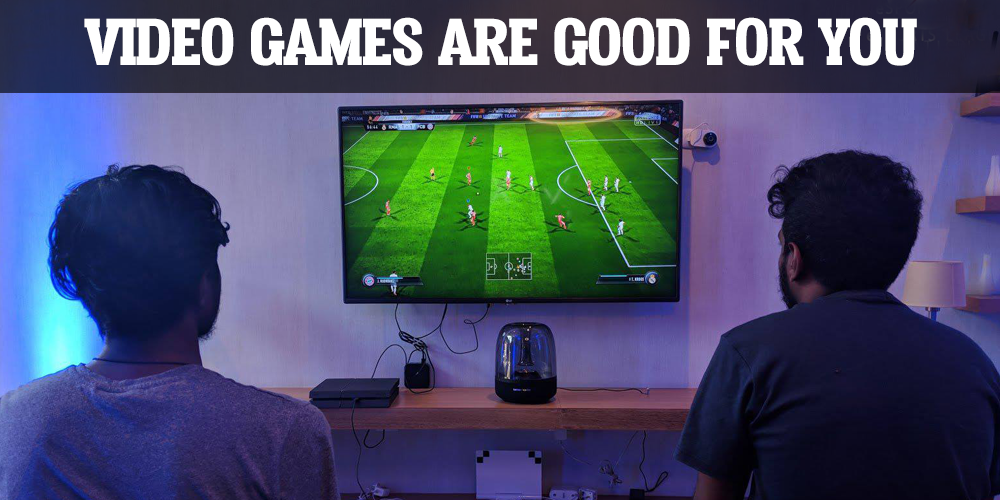Early this year, the World Health Organisation listed Gaming addiction as a mental health condition for the first time. They went on to describe it as a pattern of persistent or recurrent gaming behaviour so severe that it takes “precedence over other life interests”. With many countries including the UK, labelling it as a major public health issue, this topic has been gaining traction for some time.
But is being a Gamer akin to having a mental illness? Seems a bit disproportionate to label it as such, considering that addiction takes various other forms such as substance abuse. With that being said, we figured that it was high time to do a PSA on the benefits of e-sports and gaming.
Vision improvement
Bet you didn’t see this one coming, now did you? With most parents paranoid about how gaming and prolonged exposure to screens can be harmful to vision, this fear is in fact baseless. However to the contrary, researchers have found that playing games in moderation can actually improve your vision. The research goes onto highlight that FPS games can improve one’s ability to discern close shades of grey – perceiving fine differences in contrast, follow the direction of movement, detect slow rates of flicker(Guess you really need 60 FPS?) and distinguish between faces. With the improvements lasting months after gaming.
https://www.nature.com/articles/nature01647
Improved cognitive function
By utilizing problem-solving, memory, and puzzle elements, games have shown to have a positive impact on cognitive function, slowing down the aging process. Studies show that with just 10 hours of play time, games can lead to prolonged increase of cognitive function in adults. As some games continuously stream new information to HUDs in real-time, games have also been found to increase decision making capabilities, with player’s reacting up to 25 percent faster.
http://journals.sagepub.com/doi/abs/10.1111/j.1467-8721.2009.01660.x
Faster reflexes and hand-eye coordination
With fast paced action games requiring the user to respond to quick time events with precise button mashing combos, it’s a no brainer that gamers get quite the work out for their hands. Keeping this in mind, surgical residents play games to keep their hand-eye coordination high and reflexes sharp. With three hours or more per week played, the gamer surgeons made 32% fewer errors during practice procedures.
http://journals.sagepub.com/doi/abs/10.1177/0956797616650300
https://www.medicalbag.com/lifestyle/gamers-make-good-surgeons/article/472347/
Stress reduction and mood elevation
It’s a pretty mainstream idea that games induce high amounts of stress and aggression, however this is mostly due to lag and toxic players. A study performed on the millennial generation has found that playing games has become a key stress coping mechanism. Out of 1,000 participants of said study, 55% play games to relax and blow off steam. The escapism nature of gaming helps process or deal with a mental health issue or concern. As this has an uplifting effect on players, it allows them to look upon other aspects of their lives more positively. A third involved in the study also mentioned that they continue playing games due to the achievement or accomplishment they receive through gaming, receiving high adrenaline rushes from their victories.
https://www.makeuseof.com/tag/video-game-stress-reduction-need-start-playing-right-now/
https://www.mcgill.ca/channels/news/video-game-shown-cut-cortisol-27675
Social connections
My personal favourite amongst this list. It is a general misconception amongst the older generation that gaming makes people antisocial, but the opposite is actually true. With high speed internet getting more affordable and more widespread, there has been a steady rise in the popularity of online multiplayer games. With games focused on players to work together to finish missions or compete against teams of other players for victory, this has given way to a new form of socializing.
Many friends and connections have been made during those late nights of Dota, Fortnite and Overwatch. Shout out to my close friends Onca, Thunder and everyone else I’ve met through gaming. Games have also shown to be a great way of keeping in touch with old friends regardless of physical proximity.
Exposure to new culture
Most single player games like the Assassins Creed series, use actual historical events as a basis to drive their stories. With well written characters and immersive environments, games can spark one’s interest in discovering more about the culture the game is set in. This in turn leads to players developing curiosity towards said culture, obtaining books and relevant resources connected to the setting of the game. It is even more noticeable in the younger demography with parents stating that their children are more engaged in learning about historical events, hopefully leading to a lifetime appreciation for other culture.
Kushan Dodanwala, the Director at Redline Technologies had this to say
“One of my favourite games when I first started gaming was the Age of Empires series, with Age of Empires II being one of the first RTS games I ever tried. All the story campaigns were based on real events – from Joan of Arc to Genghis Khan. This opened the door to and got me interested in global history. When it came to my O/Ls, history was an optional subject which I didn’t really bother studying as I had already learned as much as I could on my own. Instead I opted out for the easier route with health science. I once visited a relative who was a teacher and he was tutoring a student history for O/Ls, and the lesson was on the Hun invasion of Constantinople. I overheard the lesson, and was able to explain it better than the text book purely based on my experience of playing this game. The teacher, being the experimental type, learned the game himself, recommended all his students to play it, and based some lessons off in game scenarios. “
New perspectives
With most story drive games going the first person shooter styled camera angle, it’s pretty easy to get immersed in a good game. By taking on the role of the main character, players are pushed into a different perspective. As the story progresses, players find themselves investing in relationships and making decisions for the main character, often sympathizing with the characters. This tends to build empathy in players as they are able to “ live “ different lives with varied circumstances and situations. When I first played Dishonored, I was thrust into the role of Corvo Attano.
The last bodyguard to Empress Jessamine Kaldwin, Corvo is framed for her murder and the abduction of her daughter, Emily. As the game goes on, Corvo must escape confinement, eliminate those involved in the assassination of the Empress and restore Emily to the throne. Once I was done playing the game, I realized how much more empathy I had developed towards people caught in the wrong place, at the wrong time.
There you have it folks, 7 benefits of gaming. We hope this clears up the stigma and mainstream myths on how gaming is bad for you. While we do agree that getting addicted to anything can be harmful to you, gaming in moderation is as beneficial as any other leisure activity, as the benefits outweigh the risks.









